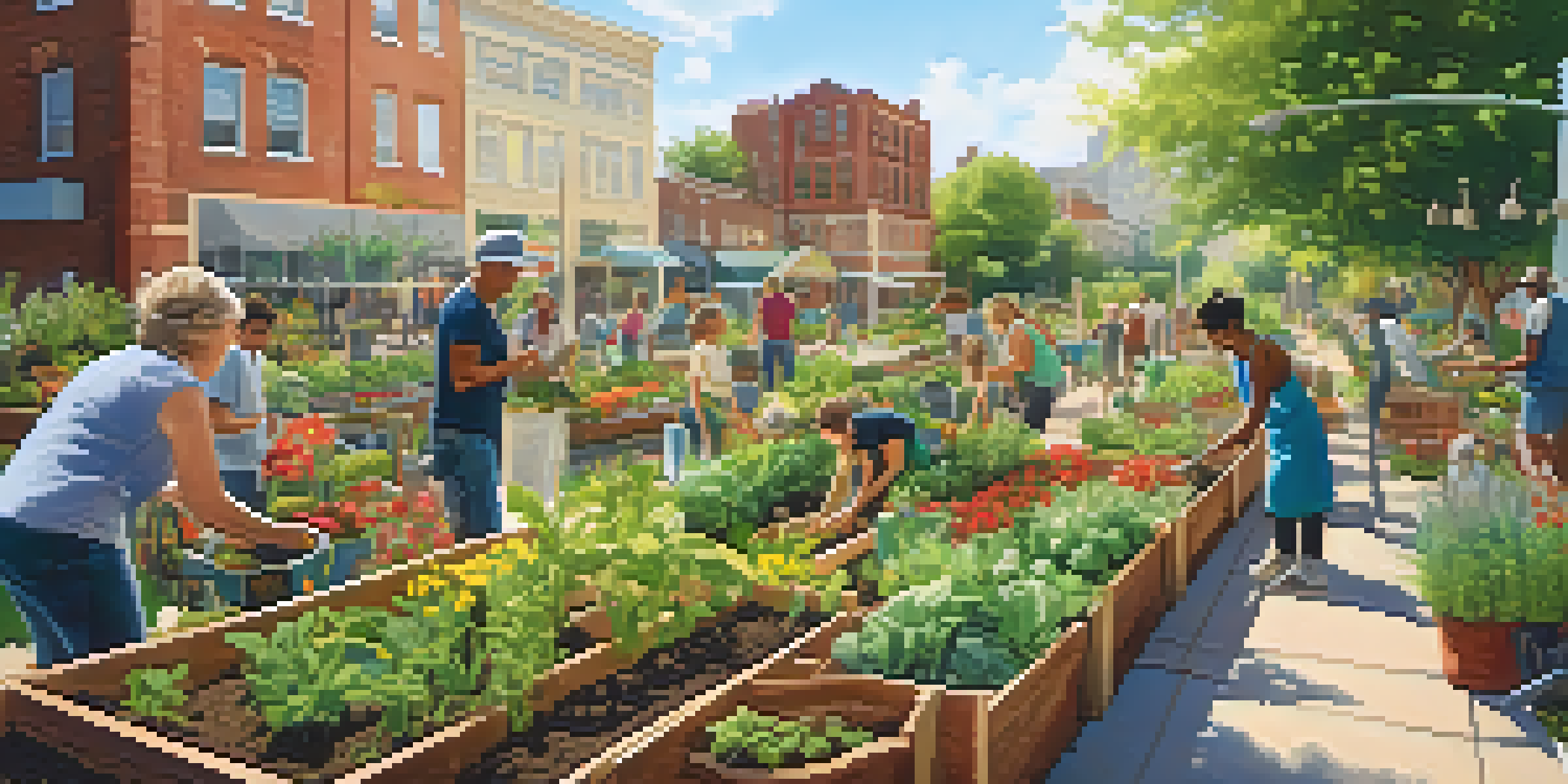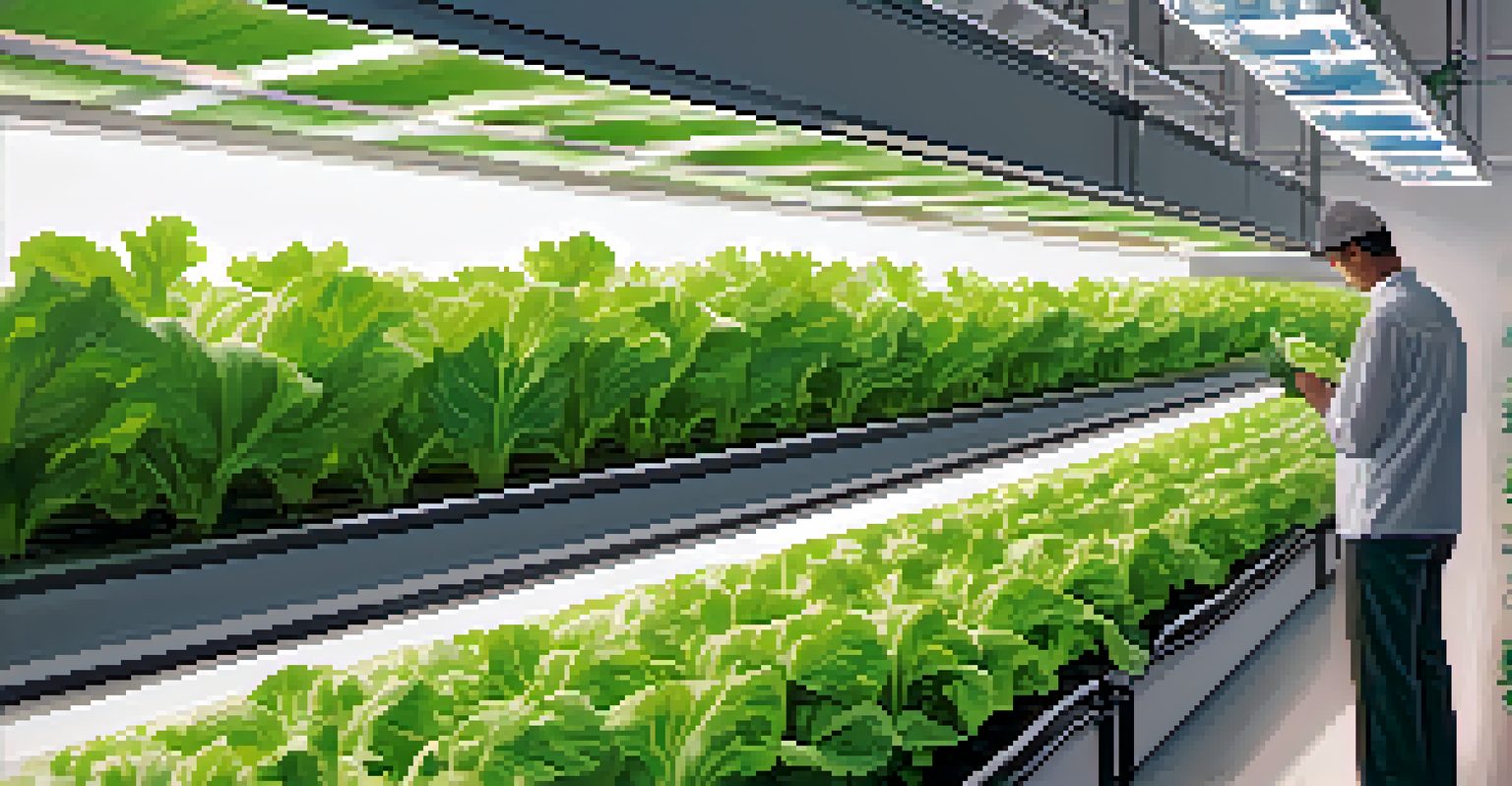The Impact of Urban Agriculture on Sustainable Living

Understanding Urban Agriculture and Its Scope
Urban agriculture refers to the practice of cultivating, processing, and distributing food in urban areas. This can include everything from community gardens to rooftop farms. By bringing food production closer to consumers, urban agriculture helps address food deserts, where access to fresh produce is limited.
Urban agriculture is not just about growing food; it's about growing community.
The scope of urban agriculture is vast, encompassing various techniques such as vertical farming, hydroponics, and even aquaponics. Each method has its unique benefits, from saving space to using less water. This diversity allows urban farmers to adapt to their specific environments and community needs.
Moreover, urban agriculture fosters a sense of community as neighbors collaborate on projects and share resources. It transforms unused spaces into vibrant green areas, promoting both environmental sustainability and social interaction.
Environmental Benefits of Urban Farming
One of the most significant impacts of urban agriculture is its positive effect on the environment. Urban farms can help reduce the urban heat island effect, which occurs when cities become significantly warmer than their rural surroundings. By introducing greenery, these farms can lower temperatures and improve air quality.

Additionally, urban agriculture promotes biodiversity by providing habitats for various species, including pollinators like bees and butterflies. This is essential for maintaining healthy ecosystems, particularly in densely populated areas where natural habitats are often lost.
Urban Agriculture Enhances Community
Urban agriculture fosters community engagement and collaboration, transforming unused spaces into vibrant green areas.
Urban farms also contribute to waste reduction by utilizing composting practices and recycling organic materials. By turning food waste into compost, urban farmers can enrich their soil and minimize landfill contributions, showcasing a closed-loop system in action.
Economic Advantages for Urban Communities
Urban agriculture can significantly boost local economies by creating jobs and supporting small businesses. Farmers' markets and local produce stands provide opportunities for entrepreneurs to sell their goods directly to consumers. This not only benefits the farmers but also keeps money circulating within the community.
The future of food is urban, and it’s up to all of us to shape it.
Moreover, investing in urban agriculture can lead to increased property values in neighborhoods, as green spaces are often seen as desirable. Communities that embrace urban farming may attract new residents and businesses seeking a vibrant environment.
Additionally, urban agriculture can reduce food costs for residents. By growing their food or purchasing it locally, consumers can save money while enjoying fresher, healthier options. This economic shift promotes self-sufficiency and resilience in urban areas.
Social Impacts of Urban Agriculture
Urban agriculture plays a vital role in enhancing social cohesion within communities. Working alongside neighbors in a communal garden fosters relationships and encourages collaboration. These shared experiences can lead to stronger bonds and a greater sense of belonging.
Furthermore, urban farming can serve as a platform for education, where individuals learn about nutrition, sustainability, and food production. Workshops and community events can empower residents with the knowledge they need to make informed choices about their food and health.
Environmental Benefits of Urban Farms
Urban farms improve air quality and reduce the urban heat island effect while promoting biodiversity.
Importantly, urban agriculture can also address social inequalities by providing access to fresh produce in underserved areas. By prioritizing inclusivity, these initiatives can help combat food insecurity and promote healthier lifestyles for all community members.
Challenges Facing Urban Agriculture Initiatives
Despite its many benefits, urban agriculture faces several challenges that can hinder its effectiveness. Limited space in densely populated areas often restricts the scale of farming operations. This can make it difficult for urban farmers to meet the growing demand for fresh produce.
Moreover, zoning laws and regulations can pose significant obstacles. Many cities have strict rules regarding land use, which can limit where and how urban agriculture projects can operate. Navigating these bureaucratic hurdles requires advocacy and community engagement.
Additionally, access to resources such as water, funding, and technical knowledge can be barriers for aspiring urban farmers. Ensuring that these resources are available to all community members is vital for fostering a thriving urban agriculture movement.
Innovative Technologies in Urban Farming
Innovative technologies are transforming urban agriculture, making it more efficient and sustainable. Vertical farming, for example, allows growers to maximize space by stacking crops in layers, making it possible to produce more food in smaller areas. This approach is particularly beneficial in cities where land is at a premium.
Hydroponics and aquaponics are also gaining traction, utilizing soil-less growing methods that conserve water and nutrients. These techniques can be implemented indoors or outdoors, providing flexibility for urban farmers to adapt to different environments.
Economic Growth Through Local Farming
Urban agriculture boosts local economies by creating jobs, increasing property values, and reducing food costs for residents.
Furthermore, the rise of smart farming technologies, such as sensors and automated systems, allows farmers to monitor crop health and optimize growing conditions. This data-driven approach enhances productivity and minimizes resource waste, paving the way for a more sustainable future.
The Future of Urban Agriculture and Sustainable Living
As cities continue to grow, the importance of urban agriculture in promoting sustainable living will only increase. By adopting practices that prioritize local food production, communities can reduce their carbon footprints and enhance food security. The shift towards urban farming represents a proactive approach to addressing environmental challenges.
Moreover, urban agriculture encourages a culture of sustainability, inspiring residents to adopt eco-friendly practices in their daily lives. From composting to reducing food waste, these initiatives can lead to a more conscious approach to consumption.

Looking ahead, the integration of urban agriculture into city planning and policy will be crucial. By fostering supportive environments for urban farming, cities can cultivate resilience, promote health, and enhance the quality of life for all residents.